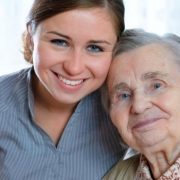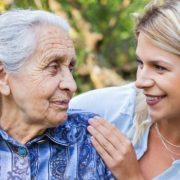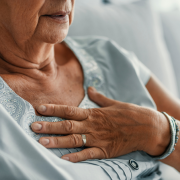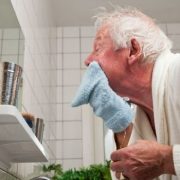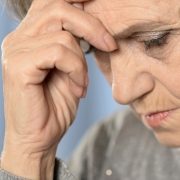Nutrition for elderly – how to maintain healthy diet when you’re older?
Maintaining balanced diet is important especially in the older age. Healthy eating for seniors can be tricky. Our bodies change thus needing more specific nutrients to prevent potentially threatening deficiencies. Your senior loved one may suffer from bowel-related issues or sarcopenia which is age-related loss of muscle and strength. They all can be managed by implementing diet for elderly rich in protein, iron, fibre, vitamin D and vitamin B12.
Difficulties that impede proper nutrition for older adults
Elders often experience problems with eating and drinking, which can be caused by various factors. Most of them are related with getting older, but some are connected with chronic conditions.
- Changes in a sense of taste – it is truth universally acknowledged, that with age comes troubles with hearing and sight. Unfortunately, the sense of smell and taste suffer too and that results in decreased appetite. Not wanting to eat regularly can be detrimental for senior health as they tend to lose weight easily.
- Mouth and digestive problems – pain while eating, constipation or flatulence are without a doubt age-related challenges that prevent from maintaining healthy eating habits. On top of that taking medication that cause nausea discourage from enjoying a meal.
- Depression – feeling depressed in our golden years is not uncommon. Changes in our bodies and environment can make us feel uneasy. Death of a close friend or chronic illness diagnosis are a common triggers.
- Dementia – elders with dementia may experience difficulty with preparing meals. Forgetting to eat can also occur.
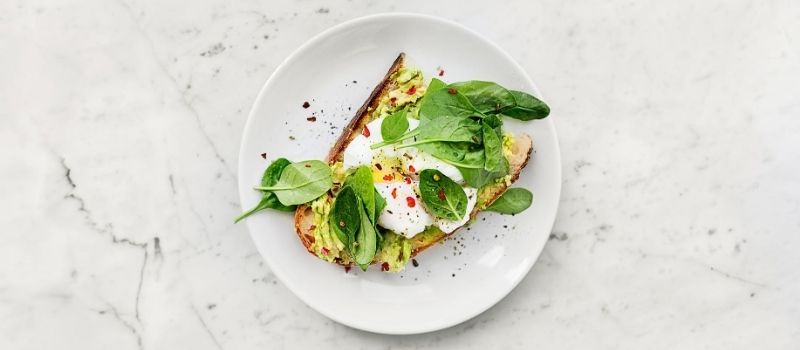
Diet for elderly
Nutrition for older adults doesn’t have to be overcomplicated. Balanced diet is easy to digest, does not require fasting and is not restrictive. On the contrary, we can still enjoy the variety of our favourite products without sacrifice. We need to follow a few simple rules to enjoy a long and healthy life:
- Eat often (4 or 5 meals a day);
- Limit the serving size;
- Don’t forget to drink water as older people are prone to dehydration;
- Avoid sweets – cakes, cookies, carbonated drinks.
Diet for elderly should consist of:
- 6-8 portions of grain products – give up white bread and choose whole grain products,
- 4-5 servings of vegetables and fruits,
- 2-3 servings of low-fat dairy products,
- 2-3 portions of meat (white, lean) or fish (lean),
- 4-5 servings a week of nuts, seeds, legumes,
- 2–3 servings of fats, e.g. olive oil, rapeseed oil, butter or margarine.
Take into consideration all the dietary restrictions (e.g. allergies). Remember, when creating diet for elderly it is advised to consult with the GP. Older people often suffer from protein deficiency, you can remedy this by implementing some protein drinks for elderly. They will help build muscle mass and are usually very tasty.
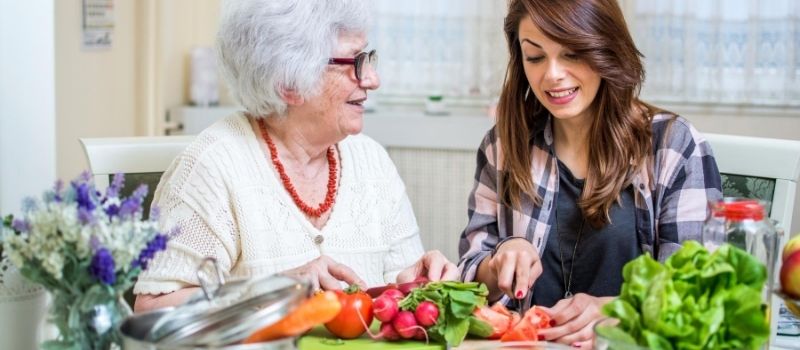
What foods should the elderly avoid?
Your elderly loved one should eliminate excessive consumption of salt, sugar and saturated trans fats. Stay away from highly processed foods, sugary carbonated drinks and fast food. As for the specific products they should avoid, it is mainly foods that can cause food poisoning. Uncooked eggs, meat, raw fish, unpasteurized milk and soft cheeses (Camembert, Brie, Chèvre, Roquefort) are amongst them. Older people are at higher risk from developing complication due to foodborne illness e.g. severe dehydration or sepsis.
List of restricted foods may change depending on the health condition of a patient. If your elderly loved one suffers from dementia or Alzheimer’s, read about dementia diet.


